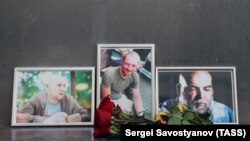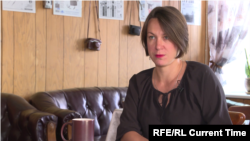One year after the murder of three Russian journalists in the Central African Republic, a bitter battle has re-erupted between the Russian foreign ministry and the widow of one of the deceased over the Russian government’s handling of the investigation.
Irina Gordienko, the former spouse of freelance reporter Orkhan Dzhemal, indicated in a July 30 interview with Current Time that Russia has effectively stopped investigating the murders.
“[V]ery valuable clues and evidence have been irrevocably lost,” she said.
Dzhemal, documentary filmmaker Aleksandr Rastorguyev, and camera operator Kirill Radchenko were shot dead in the Central African Republic on July 30, 2018 while making a documentary film about the work of ChVK Vagner, a Russian mercenary company often seen as close to the Kremlin.
The billionaire Russian opposition activist Mikhail Khodorkovsky, an outspoken critic of Russian President Vladimir Putin, was financing the journalists’ investigation.
Despite an international outcry that the journalists had been killed because of their investigation, Russian state investigators, working with the Central African Republic’s government, found that the journalists had been killed in an that a group of Arabic-speaking, armed robbers had killed the journalists after they refused to hand over their cameras and video equipment. The country has been ravaged by conflict with multiple rebels since 2013.
But Gordienko, a journalist who is covering the investigation for the independent Russian news site Novaya Gazeta, believes that individuals linked to ChVK Vagner and the company’s putative owner, Yevgeny Prigozhin, a Russian businessman believed close to President Putin, are connected with the murder. (Prigozhin denies ties with Vagner.)
She claims that Russian state investigators have stonewalled on this line of inquiry, neglecting to analyze evidence or refusing outright to re-interview potential key witnesses. In a July 30 article for Novaya Gazeta, she provided an overview of evidence by Khodorkovsky's Dossier Centre that refutes the official explanation for the deaths.
On August 1, though, the Russian foreign ministry countered that its own questions about the journalists’ trip remain unanswered, TASS reported.
Reviving earlier complaints, it blamed the journalists themselves and their employers, Khodorkovsky’s Investigation Management Center, for taking inadequate security precautions for a conflict zone and not informing the Russian embassy about the real reason for their visit. It claimed that the Russian embassy “might have provided assistance” with security “and would possibly have prevented such tragic consequences.”
On July 31, Russian Foreign Ministry spokeswoman Maria Zakharova addressed one of Gordienko’s central criticisms – the lack of a forensic analysis on the clothes Djemal, Rastorguyev, and Radchenko were wearing at the time of their deaths.
These and other personal items still have not been sent to Moscow from the Russian embassy in the Central African Republic for forensic analysis, Gordienko alleged to Current Time.
The Russian government excluded the use of a diplomatic pouch, she claimed, while the Ministry of Defense reportedly told state investigators “that Russian planes don’t fly” to the Central African Republic. The state-run Investigative Committee said it could not afford the shipment, she added.
“Of course, if they had been interested, these things would have been here a long time ago,” Gordienko commented.
In response to Gordienko's Novaya Gazeta article, Zakharova asserted on Facebook that the journalists’ “personal items” already have been sent to Moscow.
She termed Gordienko’s accusations “an example of routine lying,” adding that the journalist had not contacted the foreign ministry for comment.
Gordienko has asked Zakharova to let “your Facebook” know when the journalists’ belongings arrive in Moscow. She identified a state investigator as the source of her information about reasons for the past delay.
But the clothes are not her only concern.
Gordienko emphasized that only a few shells were found at the crime scene, even though the victims appear to have been shot multiple times. Nor is there yet an explanation for why grass at the site was burned a few days after their murder, she noted.
“It seems that this murder was completely professional,” she commented.
Gordienko said that Rastoguryev’s and Radchenko’s parents and she have also requested, without success, that the Investigative Committee again question Kirill Romanovsky, a reporter for the Prigozhin-associated Federal News Agency who allegedly put the journalists in contact with a local fixer. The fixer, known as Martin, reportedly secured for them the driver they used during their reporting.
A July 30 report by the Khodorkovsky-financed Dossier Centre stated that messaging and phone data indicate that this driver, Bienvenue Douvokama, remained in constant phone contact with a police officer, Emmanuel Kotofio, the day of the murder.
It further asserted that Gordienko’s husband and his colleagues had been under constant government surveillance from the moment of their arrival in the Central African Republic.
The report alleges that Kotofio stayed in touch with one Aleksandr Sotov, identified as a ChVK Vagner “instructor in surveillance, counter-surveillance, recruitment and intelligence.” The Centre claims that Sotov was communicating with Valery Zakharov, a Russian national security advisor to the president’s office, whom the news site Fontanka.ru has linked to Prigozhin.
Gordienko said that the Invetigative Committee also has turned down requests for investigators to question Sotov and Zakharov.
She asked that the Investigative Committee send representatives to the Central African Republic for further investigation.
The Investigative Committee itself does not appear to have responded publicly yet to Gordienko’s allegations of neglect. Information about the case on its website has not been updated since January 19.
That month, Committee spokeswoman Svetlana Petrenko charged that the Investigation Management Center was “initiating media reports” on the case and accusing “the innocent” in order “to justify the mistakes it made during preparations for the trip.”
Russian Foreign Ministry spokesperson Maria Zakharova earlier had stated that her ministry places “particular importance on this case.”
At this June’s St. Petersburg International Economic Forum, Russian Foreign Minister Sergei Lavrov urged the Central African Republic’s foreign minister, Sylvie Baipo-Temon, to accelerate the investigation into the journalists’ death, TASS reported.
Despite such statements, Gordienko believes that the government “will never investigate this case.”
Nonetheless, she emphasized, her friends and those of her late husband intend to persevere.
“[W]e won’t drop this so long as we haven’t found the people immediately connected to this murder; particularly those who gave such an order,” she said.






Facebook Forum